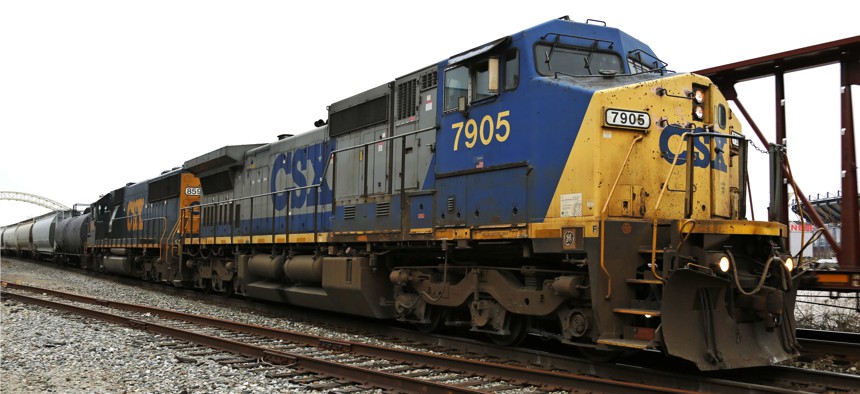Disputes Over State Taxes on Train Fuel Won't Go Before Supreme Court

CSX freight trains pass in downtown Pittsburgh Thursday, March 2, 2017. AP Photo/Gene J. Puskar
A federal law has led to years of messy litigation over levies on locomotive diesel.
Alabama’s legal battle with a railroad over taxes that the state imposes on the diesel fuel that locomotives burn will for now not get a third airing before the U.S. Supreme Court.
The court on Monday declined to hear the case, along with a separate but similar dispute out of Tennessee.
Each of the cases have to do with the Railroad Revitalization and Regulatory Reform Act, or “4-R Act,” a federal law that prohibits state and local governments from imposing certain taxes that discriminate against rail carriers regulated by the federal government.
There have been at least 75 separate lawsuits involving the tax provisions in the law since it was enacted in 1976, according to the Multistate Tax Commission, whose members include state agencies that oversee tax administration.
The commission had urged the Supreme Court in an amicus brief to take up the Alabama case.
But the group suggested that even if the court addressed the questions at issue in this stage of the proceedings it would not resolve more fundamental problems states face with the 4-R Act.
Alabama’s petition asking the court to hear the case described how railroads, citing the federal law, began bringing litigation in the 1990s against state taxes on diesel fuel. These claims began in Alabama in 2008, with seven rail carriers filing four lawsuits.
Railroads can buy what’s known as dyed diesel fuel, which is not subject to federal or state fuel taxes like those that motorists and truckers pay when they fill up their vehicles.
But Alabama imposes a 4% sales and use tax that covers dyed diesel.
As part of a court fight that’s gone on now for over a decade, CSX Transportation sued Alabama, claiming that the sales and use tax on locomotive fuel discriminates against railroads because it is not applied to the diesel used by trucks and water carriers, like barges.
Different questions in the case have come before the Supreme Court on two other occasions, most recently in 2014.
This time, Alabama wanted the court to review a ruling from the 11th U.S. Circuit Court of Appeals, which found that while the state could justify its exemption from the sales and use tax for truckers, it had failed to do so for water carriers.
While truckers don’t pay the sales and use tax on fuel in Alabama, they do pay a 19 cent per gallon state excise tax on diesel, along with a roughly 24 cent per gallon federal fuel tax.
For CSX trains, Alabama says that between 2007 and 2016 its state and local taxes for fuel totaled about 23 cents per gallon.
These taxes for truck and train fuel, the appeals court ruled, are roughly equivalent.
But cargo vessels traveling in and out of Alabama on the water don’t pay a state tax on dyed diesel under an exemption enacted in 1939.
The question that Alabama wanted the Supreme Court to answer was: When can a state justifiably maintain a sales-and-use tax exemption for fuel used by watergoing vessels to transport goods interstate, without extending the same exemption to rail carriers?
CSX, meanwhile, filed a cross-petition asking that if the Supreme Court granted Alabama’s request, it also review another part of the court of appeals’ ruling that says how states spend tax revenue is irrelevant to determining whether a tax is discriminatory under the 4-R Act.
A key part of the railroad’s argument on this front is that the fuel taxes that trucking firms pay go toward spending on highways and other transportation infrastructure that benefits their industry, while the same is not true for the sales and use tax levied on railroad diesel.
The Tennessee case that the Supreme Court declined to hear, which was brought by Illinois Central Railroad Co., dealt with issues similar to those raised in the CSX cross-petition.
In that case, the railroad asked the court to consider whether a Tennessee tax on diesel for locomotives, which truckers are exempt from, violates the 4-R Act.
The 6th U.S. Circuit Court of Appeals upheld the tax, deeming it “roughly equivalent” to the fuel taxes motor carriers do pay in the state.
It isn’t immediately clear what will happen next in Alabama.
A spokesman for the state’s department of revenue referred questions to the state’s solicitor general. The press contact for the attorney general’s office and the solicitor general both did not respond to requests for comment. CSX declined to comment.
The 11th Circuit ruling gave the state two options to fix the discrimination it found: stop collecting the taxes on fuel from the railroad, or revoke the exemption from the tax for water carriers.
Alabama said in court filings that at least eight railroads have sued seeking refunds for tax payments on fuel totaling about $24 million, not including interest, and that CSX stopped paying the state tax in 2011. Most of the tax revenue, the state says, goes to public schools.
The Multistate Tax Commission said in their brief that past court rulings concerning the 4-R Act aren't well-grounded in established legal principles, forcing states to resolve issues concerning the law on a case-by-case basis in court.
States, the commission adds, have two choices: “undertake the costs and risks of litigation to resolve all manner of contested taxes, or grant railroads most-favored-taxpayer status.”
Bill Lucia is a Senior Reporter for Route Fifty and is based in Olympia, Washington.
NEXT STORY: Tracking State Spending in Real Time with Budget Transparency Websites






